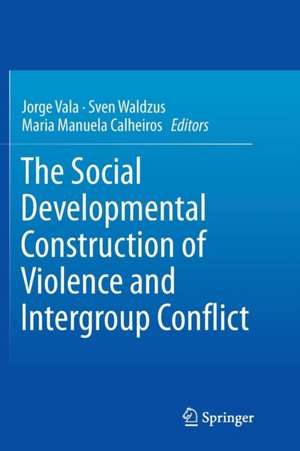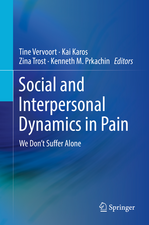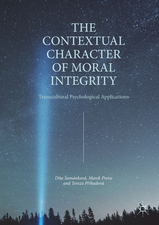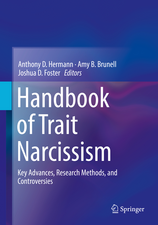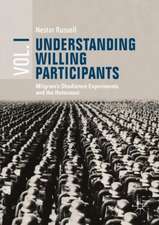The Social Developmental Construction of Violence and Intergroup Conflict
Editat de Jorge Vala, Sven Waldzus, Maria Manuela Calheirosen Limba Engleză Paperback – 22 apr 2018
| Toate formatele și edițiile | Preț | Express |
|---|---|---|
| Paperback (1) | 638.89 lei 6-8 săpt. | |
| Springer International Publishing – 22 apr 2018 | 638.89 lei 6-8 săpt. | |
| Hardback (1) | 645.14 lei 6-8 săpt. | |
| Springer International Publishing – 26 aug 2016 | 645.14 lei 6-8 săpt. |
Preț: 638.89 lei
Preț vechi: 751.64 lei
-15% Nou
Puncte Express: 958
Preț estimativ în valută:
122.26€ • 130.73$ • 101.93£
122.26€ • 130.73$ • 101.93£
Carte tipărită la comandă
Livrare economică 17 aprilie-01 mai
Preluare comenzi: 021 569.72.76
Specificații
ISBN-13: 9783319826479
ISBN-10: 3319826476
Ilustrații: XVIII, 246 p. 14 illus.
Dimensiuni: 155 x 235 mm
Greutate: 0.38 kg
Ediția:Softcover reprint of the original 1st ed. 2016
Editura: Springer International Publishing
Colecția Springer
Locul publicării:Cham, Switzerland
ISBN-10: 3319826476
Ilustrații: XVIII, 246 p. 14 illus.
Dimensiuni: 155 x 235 mm
Greutate: 0.38 kg
Ediția:Softcover reprint of the original 1st ed. 2016
Editura: Springer International Publishing
Colecția Springer
Locul publicării:Cham, Switzerland
Cuprins
Part I: Power, Self and Intergroup Relations.- Chapter 1. Power and the Social Self (Ana Guinote).- Chapter 2. From the Sense of Self to the Understanding of the Relationships between social Groups (Dalila França).- Chapter 3. Intergroup Relations and Strategies of Minorities (Joana Alexandre).- Part II: Social Construction of identities and Social Categories.- Chapter 4. "Back to the Future": Ideological Dimensions of Intergroup Relations (Jacques-Philippe Leyens).- Chapter 5. The Common Intergroup Identity Model and The Development of a Functional Perspective: A Cross-National Collaboration (Sam Gaertner).- Chapter 6. When Beliefs become Stronger than Norms: Paradoxical Expressions of Intergroup Prejudice (Annelyse Pereira).- Part III: Social Developmental processes of Violence.- Chapter 7. Parent-Child Interactions as a Source of Parent Cognition in the Context of Child Maltreatment (Maria Manuela Calheiros).- Chapter 8. The Promotion of Violence by the Mainstream Media Communication (Patrícia Arriaga).- Chapter 9. Social-Developmental research on Intergroup relations in childhood and adolescence (João António).- Chapter 10. A Multi-Norm Structural Social-Developmental Model of Children's Intergroup Attitudes: Integrating Intergroup-Loyalty and Outgroup Fairness Norms (Ricardo Rodrigues).
Notă biografică
JORGE VALA, PhD in Social Psychology, University of Louvain (1984), was a full professor at ISCTE, and is currently senior researcher at the Institute of Social Sciences (ICS)/University of Lisbon. At ICS, his research focuses on socio-cognitive processes in the field of social representations and ideologies, social norms and social identities. His present projects articulate these processes with the study of racism and prejudice, immigration issues, political attitudes, social justice, and validation of everyday knowledge.
Jorge Vala was invited professor at several universities, including the University René Descartes-Paris, Ecole des Hautes Etudes en Sciences Sociales and the State University of Rio de Janeiro. He was a member of the Executive Committee of the European Association of Experimental Social Psychology, President of the Portuguese Association of Psychology, Editor of the Revista Psicologia. He was the Portuguese representative on the European Programme COST, as well as President of the Department of Social and Organizational Psychology at ISCTE. Currently, he is the national coordinator for the European Social Survey, and member of the Scientific Committee of the European Values Study. He is also member of the Scientific Board of the Fondation Suisse pour la Recherche en Sciences Sociales (FORS). Between May 2007 and September 2009, he chaired the ICS Academic Board; and is currently ICS Director. SVEN WALDZUS, studied psychology in Germany, received his PhD in 1999 at Friedrich-Schiller University, Jena and worked in several research projects, but also as consultant and trainer in schools and other public or non-profit organizations. Since 2002 he has been teaching at the Department of Social and Organizational Psychology of the University Institute of Lisbon (ISCTE-IUL), since 2011 as Associate Professor. His research covers several areas of intergroup relations, such as social identity, ethnocentrism, intergroup tolerance and extremenegative behaviour towards outgroups. Currently, his research interest focusses on cognitive-motivational models of social relations, their embodiment and relevance in intergroup relations.
From 2003 to 2008 he was executive director of the Centro de Investigação e Intervenção Social of ISCTE, which hosts the largest group of social psychologists in Portugal. From 2010 to 2012 he was head of the Department of Social and Organizational Psychology, and from 2013 to 2015 director of the PhD program in Psychology at ISCTE-IUL, which is funded since 2014 by the Portuguese Foundation of Science and Technology (FCT). From 2006 to 2008 he was associated editor of the European Journal of Social Psychology.
MARIA MANUELA CALHEIROS, PhD in Community Social Psychology ISCTE (2003), is an Assistant Professor at the Department of Social and Organizational Psychology of the University Institute of Lisbon (ISCTE-IUL). Her research interests cover the areas of education, well-being and risk factors associated to child and youth development; parental abuse and neglect; and the design and evaluation of intervention programs with abusive and neglectful families and institutionalized children and youth.
From 2006 to 2013 she was the coordinator of the Masters in Community Psychology and Child Protection, from 2010 to 2013 she was the President of the Portuguese Association of Psychology and from 2012 to 2014 she was head of the Department of Social and Organizational Psychology.
With a strong focus on social intervention, Maria Manuela Calheiros has developed several research-based projects on programs that have been applied in different private and public institutions. She has a strong links to the community and has been working with the government (at the national level and the Council of Europe) in providing technical information to support the creation of regulations and guidelines (e.g., for preventing violence towards children), implementing changes in institutions and facilitating the national implementation of European politics.
Jorge Vala was invited professor at several universities, including the University René Descartes-Paris, Ecole des Hautes Etudes en Sciences Sociales and the State University of Rio de Janeiro. He was a member of the Executive Committee of the European Association of Experimental Social Psychology, President of the Portuguese Association of Psychology, Editor of the Revista Psicologia. He was the Portuguese representative on the European Programme COST, as well as President of the Department of Social and Organizational Psychology at ISCTE. Currently, he is the national coordinator for the European Social Survey, and member of the Scientific Committee of the European Values Study. He is also member of the Scientific Board of the Fondation Suisse pour la Recherche en Sciences Sociales (FORS). Between May 2007 and September 2009, he chaired the ICS Academic Board; and is currently ICS Director. SVEN WALDZUS, studied psychology in Germany, received his PhD in 1999 at Friedrich-Schiller University, Jena and worked in several research projects, but also as consultant and trainer in schools and other public or non-profit organizations. Since 2002 he has been teaching at the Department of Social and Organizational Psychology of the University Institute of Lisbon (ISCTE-IUL), since 2011 as Associate Professor. His research covers several areas of intergroup relations, such as social identity, ethnocentrism, intergroup tolerance and extremenegative behaviour towards outgroups. Currently, his research interest focusses on cognitive-motivational models of social relations, their embodiment and relevance in intergroup relations.
From 2003 to 2008 he was executive director of the Centro de Investigação e Intervenção Social of ISCTE, which hosts the largest group of social psychologists in Portugal. From 2010 to 2012 he was head of the Department of Social and Organizational Psychology, and from 2013 to 2015 director of the PhD program in Psychology at ISCTE-IUL, which is funded since 2014 by the Portuguese Foundation of Science and Technology (FCT). From 2006 to 2008 he was associated editor of the European Journal of Social Psychology.
MARIA MANUELA CALHEIROS, PhD in Community Social Psychology ISCTE (2003), is an Assistant Professor at the Department of Social and Organizational Psychology of the University Institute of Lisbon (ISCTE-IUL). Her research interests cover the areas of education, well-being and risk factors associated to child and youth development; parental abuse and neglect; and the design and evaluation of intervention programs with abusive and neglectful families and institutionalized children and youth.
From 2006 to 2013 she was the coordinator of the Masters in Community Psychology and Child Protection, from 2010 to 2013 she was the President of the Portuguese Association of Psychology and from 2012 to 2014 she was head of the Department of Social and Organizational Psychology.
With a strong focus on social intervention, Maria Manuela Calheiros has developed several research-based projects on programs that have been applied in different private and public institutions. She has a strong links to the community and has been working with the government (at the national level and the Council of Europe) in providing technical information to support the creation of regulations and guidelines (e.g., for preventing violence towards children), implementing changes in institutions and facilitating the national implementation of European politics.
Textul de pe ultima copertă
This book describes how the violent dimension of intergroup relations can be better understood if the interplay between psychological and social-developmental factors is taken into account. Ten unique, innovative and original chapters by international scholars of social and developmental psychology address the way how social reality is constructed as a hierarchical order, and how social norms, beliefs and cognitive-behavioral patterns are learned, shared and repeatedly processed on how to uphold or challenge this social order. The volume covers diverse issues such as the effects (or lack thereof) of power and violent video games on people’s thinking and behavior, the acquisition of social norms and attitudes during childhood, minorities’ identity management strategies, the role of mothers’ educational beliefs and the impact of ideologies. This volume is inspired by the oeuvre of Maria Benedicta Monteiro, emphasizing the psychogenetic and sociogenic diacronies that are too often neglected by the predominantly synchronic paradigm of social psychology. It is therefore an indispensable reading for researchers and advanced students in social, community and developmental psychology, for scientifically interested practitioners working with families, school contexts or intergroup conflict, and for everyone interested in the expanding field of the social developmental approaches to attitudes and behaviour.
Caracteristici
Delivers a unique perspective on intergroup relations, prejudice and social discrimination, and identity Presents a new combination of developmental and social psychological perspectives Covers the underdeveloped synchronic and diachronic perspectives on intergroup relations Includes supplementary material: sn.pub/extras
